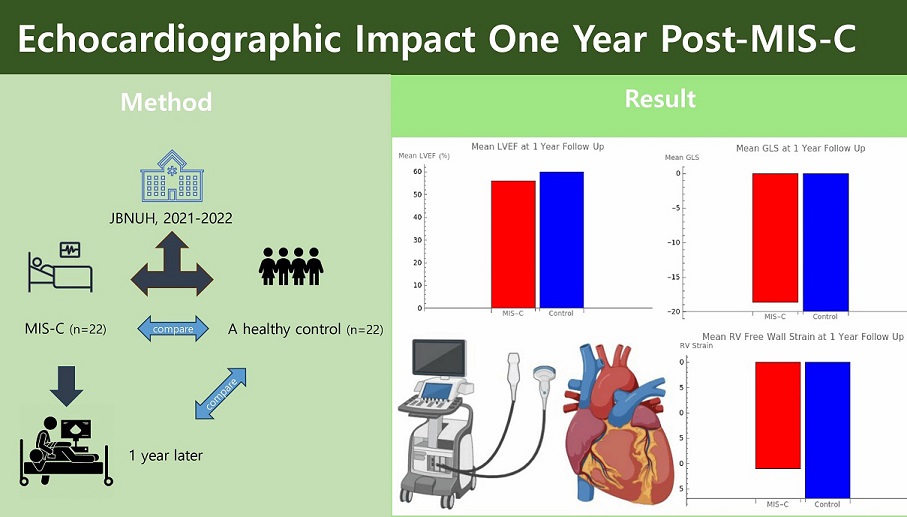Children That Had COVID-19 Induced Multisystem Inflammatory Syndrome Show Persistent Echocardiographic Changes At 1 Year After Diagnosis!
Nikhil Prasad Fact checked by:Thailand Medical News Team Mar 09, 2024 1 year, 1 month, 1 week, 2 days, 5 hours, 30 minutes ago
COVID-19 News: The COVID-19 pandemic, caused by the SARS-CoV-2 virus, has brought about a myriad of health challenges globally, affecting individuals of all age groups. Among the various complications arising from COVID-19, multisystem inflammatory syndrome in children (MIS-C) stands out as a particularly concerning manifestation. MIS-C presents as a severe inflammatory response affecting multiple organ systems in pediatric patients, often occurring weeks after initial SARS-CoV-2 infection. While the acute symptoms and management strategies of MIS-C have been extensively studied, there remains a significant gap in understanding its long-term implications, particularly on cardiac health. This
COVID-19 News report delves into a comprehensive study conducted at the Children's Hospital, Jeonbuk National University in Jeonju, South Korea, and the Research Institute of Clinical Medicine of Jeonbuk National University. The study aimed to evaluate the persistent echocardiographic changes in children diagnosed with MIS-C at a 1-year follow-up, comparing the results with a healthy control group.
 Graphical Abstract. Children That Had COVID-19 Induced Multisystem Inflammatory Syndrome Show Persistent Echocardiographic Changes At 1 Year After Diagnosis
Background
Graphical Abstract. Children That Had COVID-19 Induced Multisystem Inflammatory Syndrome Show Persistent Echocardiographic Changes At 1 Year After Diagnosis
Background
MIS-C represents a complex clinical syndrome characterized by a hyperinflammatory state affecting various organ systems, including the cardiovascular system. The precise etiology of MIS-C remains elusive, but it is hypothesized to stem from dysregulated immune responses following SARS-CoV-2 infection. This dysregulation manifests through enduring immunoglobulin G antibodies, heightened inflammatory monocyte activation, altered T-cell lymphocyte levels, enhanced CD8+ T-cell activation, and oxidative stress. Clinically, MIS-C presents with persistent fever, gastrointestinal disturbances, mucocutaneous manifestations, and cardiac involvement, with approximately 80% of cases exhibiting cardiac abnormalities. Despite the urgent need for effective management strategies, there remains a paucity of data on the long-term cardiac sequelae of MIS-C.
Methods
The study conducted a retrospective analysis of data from 22 children diagnosed with MIS-C who were admitted to Jeonbuk National University Hospital. A control group comprising 22 healthy children was included for comparative analysis. Echocardiographic data were collected at two distinct time points: at the time of diagnosis and at a 1-year follow-up. The study focused on assessing parameters such as left ventricular ejection fraction (LVEF), longitudinal strain, and global longitudinal strain (GLS) to evaluate myocardial function over time.
Results
At the time of diagnosis, children with MIS-C exhibited significant alterations in echocardiographic parameters compared to the healthy control group. These included reduced LVEF, longitudinal strain across various views, and GLS. Notably, the reduced LVEF and longitudinal strain persisted at the 1-year follow-up, indicating a lasting impact on both ventricular functions
. While LVEF and longitudinal strain remained within the normal range, the right ventricular free wall and global strain continued to be diminished compared to the control group. These findings underscore the importance of ongoing echocardiographic monitoring in children diagnosed with MIS-C to better understand and manage long-term cardiac implications.
Discussion
The study's findings shed light on the persistent echocardiographic changes observed in children diagnosed with MIS-C at a 1-year follow-up. Despite some recovery in ventricular function over time, mild subclinical left ventricular (LV) and right ventricular (RV) dysfunction persisted, emphasizing the need for continued cardiac surveillance in these patients. While conventional echocardiographic parameters did not show significant differences between MIS-C patients and the control group, subtle ventricular dysfunctions may have long-term implications that warrant further investigation.
The study also highlighted the variability in LV global longitudinal strain (GLS) values in children and compared the findings with age-matched controls. The persistent reduction in GLS in the MIS-C group, though approaching normality, indicated ongoing subclinical cardiac issues. Regional analysis revealed differences in recovery patterns between the apical and basal areas of the LV, challenging previous research and suggesting temporal variations in cardiac recovery.
Furthermore, the discussion touched upon the potential interplay between the immune response and cardiac function, emphasizing the need for further research into cytokine profiles and immune responses in MIS-C patients. The study also highlighted the dynamic nature of cardiac recovery in MIS-C patients, with variations in left atrial (LA) function and right ventricular (RV) strain over time.
Conclusion
In conclusion, the study provided valuable insights into the persistent echocardiographic changes in children diagnosed with COVID-19-induced multisystem inflammatory syndrome at a 1-year follow-up. While most parameters showed recovery, LVEF, GLS, and RV strain remained impaired, suggesting the need for ongoing cardiac function follow-up in these patients. The study emphasized the importance of further research to fully understand the long-term implications of MIS-C on cardiac health in children and guide appropriate management strategies. This comprehensive evaluation contributes to the growing body of knowledge surrounding post-COVID-19 complications in pediatric populations.
The study findings were published in the peer reviewed journal: Children.
https://www.mdpi.com/2227-9067/11/3/308#
For the latest
COVID-19 News, keep on logging to Thailand Medical News.
